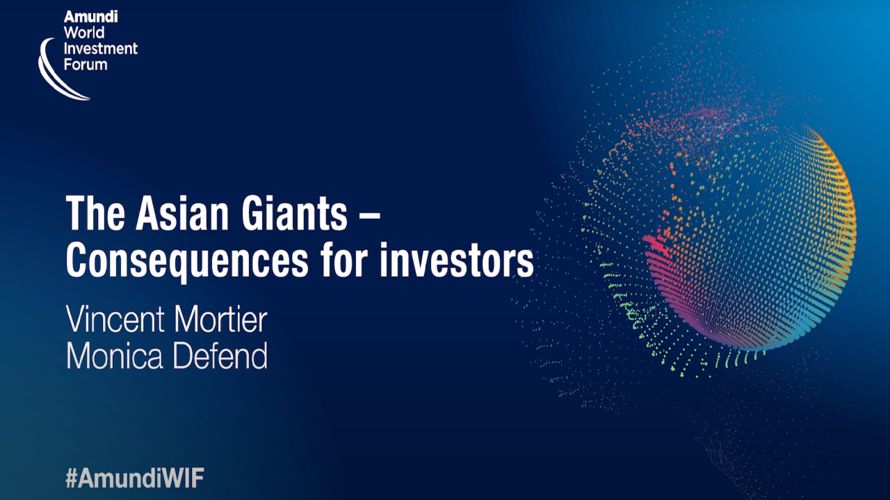The Asian giants – consequences for investors

July 2023 | 3 min read
The Asian giants – consequences for investors
India and China are transforming their economies, leading to a rebalancing of power at global level. The two Asian giants will be more and more relevant in the future, opening up to attractive opportunities for investors.
During the Amundi World Investment Forum, Monica Defend, Head of the Amundi Institute, and Vincent Mortier, Group Chief Investment Officer, shared their views on the two countries, and the state of the global economy:
• Both India and China can play a relevant role in terms of portfolio diversification*: the two countries are in a different stage of their economic transition and they hold significant geopolitical power. Their equity markets show low levels of correlation with mayor global indices and between themselves, and their inflation and debt dynamics are different.
• Different sectors are showing attractive trends in the two countries; India has the potential to expand its manufacturing business and become a major player in the global supply chain. China could grow further in services and consumer sectors. Both are technological giants and can play a crucial role in the energy transition.
• The two Asian giants are green bonds issuers; while these instruments are vital to finance the energy transition, and face a strong appetite from investors, their supply is still limited.
Nevertheless, the higher growth potential is partially counterbalanced by the heightened sensitivity to geopolitical tensions, that could potentially weight on investment flows and liquidity in some segments.
- -
Monica Defend and Vincent Mortier also covered the main trends they are currently observing and expected to drive the future:
• A tricky combination of low growth and sticky inflation is currently observed, as well as multiple transitions that are taking place at the same time. Changes in the global supply chains (onshoring, reshoring, friendshoring)1 will forge new trade patterns and influence economic dynamics of the future.
• The era of liquidity abundance from central banks is coming to an end, while debt overhang is creating some constraints in the fiscal space. Monetary and fiscal policies will have to work together to support economies.
• Looking ahead, they foresee a shift of growth and wealth from west to east. This will benefit the two Asian giants, but also other countries that can play a relevant role in the global supply chain, such as Indonesia and Vietnam.
• The energy transition will bring more growth and inflation, and with require funding. Investors will have to assess the impact that these factors could have.
• Demographics in some countries could represent a key challenge, due to an ageing population and a decline in terms of active workforce. Artificial intelligence may support some sectors but could potentially foster inequalities.
• Some companies will face increased pressures on their business models and balance sheets due to a higher cost of debt, translating in declining revenues and pressures on margins. As a result, the focus should be on quality more than ever.
- -
Investors should embrace a dynamic asset allocation, as expected returns across asset classes are going to be more volatile and less predictable. A cautious but agile approach, combining short tactical positioning with medium-term strategic decisions, should be favoured. Indeed, corporate earnings might decline further, and this will likely trigger a correction in financial markets. The view is that central banks are approaching the peak of their tightening cycle, and that the next market regime will come into place as soon as earnings and economies in general will get back to a positive track, hopefully by the end of the year.
In addition, investors should be aware of a growing disconnect between some market prices and their risk-adjusted fair value. This could be linked to psychological behaviours, including the risk of underestimating the importance of market liquidity, or the tendency to follow some investment fads with the “fear of missing out”.
In conclusion, this market disconnect could last for some time, but it should not represent an issue for investors with a long-term horizon. Each opportunity should be carefully analysed, considering the risk/reward profile and the time horizon. Especially in moments like this, investment decisions should always been thoughtful, without compromise on discipline in order to chase market rallies.
Watch the full session:

Sources:
1 Friendshoring refers to the rerouting of supply chains to countries perceived as politically and economically safe or low-risk, to avoid disruption to the flow of business – Source: https://www.weforum.org/agenda/2023/02/friendshoring-global-trade-buzzwords/
*Diversification does not guarantee profit or protect against loss.
Important information
Unless otherwise stated, all information contained in this document is from Amundi Asset Management S.A.S. and is as of 19 July 2023. Diversification does not guarantee a profit or protect against a loss. The views expressed regarding market and economic trends are those of the author and not necessarily Amundi Asset Management S.A.S. and are subject to change at any time based on market and other conditions, and there can be no assurance that countries, markets or sectors will perform as expected. These views should not be relied upon as investment advice, a security recommendation, or as an indication of trading for any Amundi product. This material does not constitute an offer or solicitation to buy or sell any security, fund units or services. All investors should seek professional advice prior to any investment decision, in order to determine the risks associated with the investment and its suitability. Investment involves risks, including market, political, liquidity and currency risks. Past performance is not a guarantee or indicative of future results.
Date of first use: 19 July 2023
Doc ID: 3007719
Learn more about our Convictions
Powered by Amundi Institute